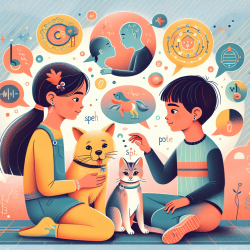Recent research has provided valuable insights into the associations between childhood attachment to pets and various positive outcomes such as compassion, humane behavior, and attitudes towards animals. The study, "Childhood Attachment to Pets: Associations between Pet Attachment, Attitudes to Animals, Compassion, and Humane Behaviour," offers critical findings that can be leveraged by practitioners in the field of speech-language pathology to enhance the therapeutic experiences and outcomes for children.
The study, conducted with over one thousand children aged 7 to 12 in Scotland, revealed that the majority of children form strong attachments to their pets. These attachments are influenced by factors such as pet type and the child’s gender. Notably, children with pets, particularly dogs and cats, demonstrated higher levels of attachment compared to those without pets.
Key Findings and Implications for Practitioners
The study highlights several key findings that can be directly applied to therapeutic practices:
- Compassion and Humane Behavior: Children who exhibit strong attachments to their pets are more likely to display compassionate and humane behaviors. Practitioners can encourage pet ownership or interaction with pets as a means to foster empathy and compassion in children.
- Positive Attitudes Towards Animals: Attachment to pets significantly predicts positive attitudes towards animals. This can be utilized in humane education programs to promote prosocial behavior and reduce instances of animal cruelty.
- Gender Differences: Girls tend to show higher attachment to pets and greater compassion and humane behavior than boys. Tailoring interventions to account for these differences can optimize outcomes.
Practical Applications
Practitioners can integrate these findings into their therapeutic approaches in several ways:
- Incorporate Pet Therapy: Utilizing therapy animals in sessions can help children develop secure attachments, which may translate to improved social and emotional skills.
- Promote Pet Care Activities: Encouraging children to participate in caring for pets can enhance their sense of responsibility and empathy. Activities such as feeding, grooming, and playing with pets can be integrated into therapy plans.
- Educational Programs: Developing programs that educate children about animal welfare and the benefits of humane treatment can foster positive attitudes and behaviors towards animals.
Encouraging Further Research
While the study provides a robust foundation, further research is necessary to explore the long-term impacts of childhood attachment to pets on mental health and well-being. Practitioners are encouraged to participate in or support research initiatives that delve deeper into these associations and examine diverse populations and settings.
To read the original research paper, please follow this link: Childhood Attachment to Pets: Associations between Pet Attachment, Attitudes to Animals, Compassion, and Humane Behaviour.










